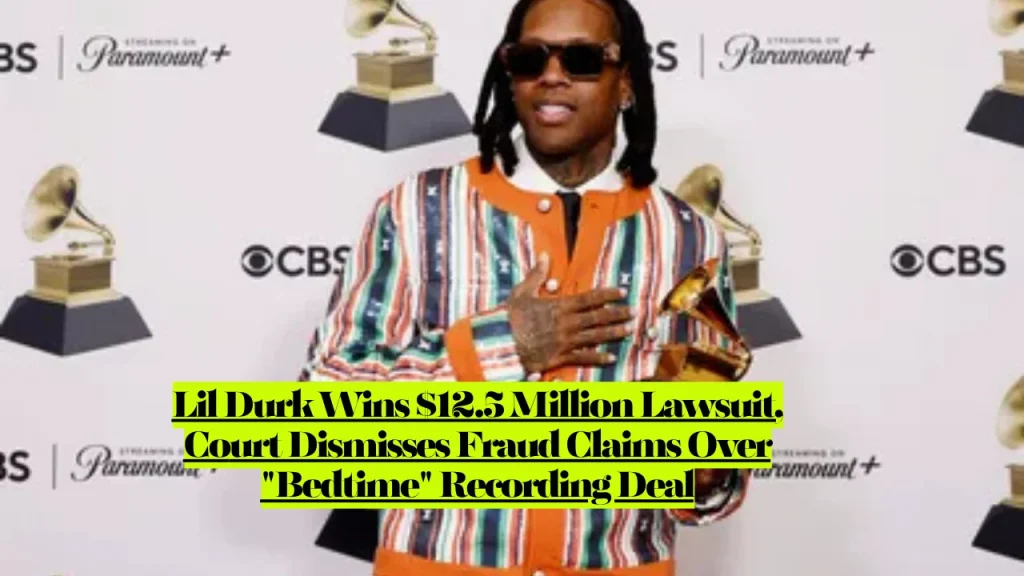Lil Durk Wins $12.5 Million Lawsuit, Court Dismisses Fraud Claims Over “Bedtime” Recording Deal
Lil Durk secured a major legal victory as the United States District Court dismissed a $12.5 million fraud lawsuit from investment firm Exceed Talent Capital with prejudice, meaning the claims cannot be refiled. The lawsuit accused the Chicago rapper and his Only The Family (OTF) label of fraudulently selling recording rights to his track “Bedtime” despite an exclusive deal with Sony’s Alamo Records. Durk waived his right to appeal, and no parties will recover legal fees.
The dismissal offers rare relief as Durk remains in federal custody awaiting trial on unrelated murder-for-hire charges scheduled for January 2026.
What Was the Lil Durk Lawsuit About?
Exceed Talent Capital filed the lawsuit in Manhattan federal court in December 2023, claiming Durk and his business manager Andrew Bonsu orchestrated a fraudulent $600,000 deal for rights to “Bedtime”. The fintech startup planned to create a fractional investment vehicle allowing investors to buy shares in the song’s ongoing royalties.
Exceed paid $450,000 of the $600,000 agreement before discovering Durk’s exclusive recording contract with Alamo Records invalidated the entire deal. In May 2023, Alamo Records sent Exceed a cease-and-desist letter stating neither Durk nor his associates possessed authority to transfer the song’s rights.
The Fraud Allegations and Legal Claims
Exceed alleged “manifest fraud” and claimed the deal caused reputational damage, financial losses related to SEC filings, and forced them to return funds to third-party investors. The company had already registered the offering with the Securities and Exchange Commission and invested significant resources in marketing and compliance before the deal collapsed.
The complaint accused Durk of making false contractual representations about his rights to the recording while knowing he had already assigned those same rights to Alamo Records under his exclusive agreement. Exceed demanded a refund but received no response, prompting the lawsuit seeking over $12 million in damages.
Related article: Are Smudge Pots Legal? State-by-State Regulations, EPA Rules, and Compliance Requirements

Why Lil Durk Won: Court’s Dismissal with Prejudice
Court records show all claims against Durk, OTF Label, and Only The Family Entertainment were dismissed with prejudice under a stipulation agreement. The “with prejudice” designation carries significant weight—it permanently bars Exceed from refiling the same claims against these defendants.
The court filing clarified that the dismissal applies exclusively to Durk and his affiliated companies, while claims against Bonsu and TTPMG, LLC—who allegedly negotiated the deal—remain active. The stipulation specifically states it shall not “release, waive, diminish, impair or otherwise affect any claims and rights that any party may possess against those non-appearing defendants”.
The rapper’s legal team successfully argued for dismissal, though specific court reasoning remains sealed in the settlement agreement.
Entertainment Law Implications: Recording Rights and Exclusive Contracts
This case highlights critical issues in entertainment contract law that affect artists, labels, and investors.
Exclusive Recording Agreements
Durk’s exclusive deal with Alamo Records, which began in 2021, gave the label comprehensive rights over his recordings. These agreements typically prevent artists from licensing or selling recording rights to third parties without label approval.
Due Diligence in Music Investments
The court documents noted that even basic research like checking Wikipedia would have revealed Durk’s multiple label affiliations. Investment firms pursuing music royalty deals must conduct thorough due diligence on existing contracts before closing transactions.
Fractional Music Royalty Investments
Exceed’s business model involved packaging song rights into fractional investment vehicles where fans and investors could buy shares of royalty streams. This emerging investment category faces heightened legal scrutiny due to SEC regulations and complex music industry contracts.
What Happens to the Remaining Defendants?
While Durk and his companies are cleared, Exceed’s lawsuit continues against former manager Andrew Bonsu and TTPMG, LLC. These parties allegedly handled direct negotiations for the “Bedtime” rights transfer.
The case illustrates how corporate structuring and proper legal representation can shield artists from liability when business partners make unauthorized deals.
Lil Durk’s Current Legal Battle
While this civil victory clears one legal obstacle, Durk faces far more serious criminal charges. Federal prosecutors accuse him of orchestrating a 2022 murder-for-hire plot targeting rapper Quando Rondo that resulted in the death of Rondo’s cousin Saviay’a Robinson.
Durk has pleaded not guilty and remains in federal custody without bond. His criminal trial has been postponed from October 2025 to January 2026.
How This Case Impacts Music Industry Deals
The dismissal sends important signals to the entertainment industry:
For Artists
Exclusive recording agreements limit monetization options. Artists should consult entertainment lawyers before exploring alternative revenue streams like fractional ownership deals.
For Investors
Music royalty investments require extensive contract review. Investors must verify artists actually possess rights they claim to sell.
For Business Managers
Managers and associates who negotiate unauthorized deals face personal liability even when artists are protected.

Legal Precedent: Celebrity Contract Disputes
Similar cases demonstrate how courts handle alleged fraudulent music deals:
Entertainment contract disputes typically hinge on whether parties had actual authority to transfer rights. When exclusive recording agreements exist, third-party deals often fail regardless of good faith negotiations.
What’s Next for Lil Durk’s Legal Situation?
With the civil lawsuit dismissed with prejudice and appeal rights waived, this financial threat is permanently resolved. However, Durk’s freedom depends entirely on the outcome of his January 2026 criminal trial.
The rapper’s legal team secured this civil victory while simultaneously fighting murder-for-hire charges that could result in life imprisonment.
Entertainment Lawyer Insights on the Victory
Entertainment attorneys note several factors likely contributed to the dismissal:
Contractual Complexity
Multiple overlapping label agreements created ambiguity about who possessed authority to negotiate the Exceed deal.
Business Manager Liability
Evidence may have shown Bonsu and TTPMG handled negotiations independently without Durk’s direct involvement.
Settlement Incentives
Both parties likely recognized litigation costs could exceed potential recovery, especially with Durk facing lengthy incarceration.
Key Takeaways from the Lil Durk Lawsuit Victory
- All fraud claims dismissed with prejudice against Durk and his labels
- Lawsuit sought $12.5 million for allegedly fraudulent “Bedtime” recording rights deal
- Claims continue against business manager Andrew Bonsu and TTPMG
- Case demonstrates importance of verifying recording contract authority
- Victory offers limited relief as Durk faces January 2026 murder-for-hire trial
FAQs About Lil Durk’s Lawsuit Victory
What lawsuit did Lil Durk win?
Lil Durk won dismissal of a $12.5 million fraud lawsuit from Exceed Talent Capital over allegations he fraudulently sold rights to his song “Bedtime” despite an exclusive deal with Alamo Records.
Can Exceed Talent Capital refile the lawsuit?
No. The court dismissed all claims with prejudice, permanently barring Exceed from refiling the same claims against Lil Durk and his affiliated companies.
What was the “Bedtime” song deal about?
Exceed agreed to pay Durk $600,000 for recording rights to create a fractional investment vehicle allowing investors to buy shares of the song’s royalties, but paid $450,000 before learning about Durk’s exclusive Alamo Records contract.
Who still faces the lawsuit?
While Durk and his labels are cleared, the lawsuit remains active against his former business manager Andrew Bonsu and TTPMG, LLC, who allegedly negotiated the deal.
How does this affect Lil Durk’s criminal case?
This civil lawsuit dismissal does not impact Durk’s separate federal murder-for-hire charges. He remains in custody awaiting trial in January 2026.
What does “dismissed with prejudice” mean?
Dismissal with prejudice permanently bars the plaintiff from refiling the same claims against the same defendants in any court. It’s a final resolution favoring the defendant.
What should music investors learn from this case?
Investors pursuing music royalty deals must conduct thorough due diligence on existing recording contracts and verify artists possess actual authority to transfer rights before completing transactions.
Disclaimer: This information is for educational purposes only and does not constitute legal advice. Consult an attorney specializing in entertainment law for legal guidance regarding recording contracts, music investments, or entertainment industry disputes.
Related Articles
- Entertainment Contract Law: Understanding Recording Agreements
- What Is Business Litigation Law
- Top Contract Negotiation Lawyers in California
About the Author

Sarah Klein, JD, is a licensed attorney and legal content strategist with over 12 years of experience across civil, criminal, family, and regulatory law. At All About Lawyer, she covers a wide range of legal topics — from high-profile lawsuits and courtroom stories to state traffic laws and everyday legal questions — all with a focus on accuracy, clarity, and public understanding.
Her writing blends real legal insight with plain-English explanations, helping readers stay informed and legally aware.
Read more about Sarah
